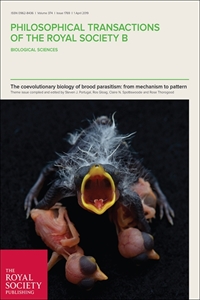The coevolutionary biology of brood parasitism: from mechanism to pattern

La prestigiosa rivista Philosophical Transactions of the Royal Society B dedica un intero speciale al tema del parassitismo di cova
Theme issue ‘The coevolutionary biology of brood parasitism: from mechanism to pattern’ compiled and edited by Steven J. Portugal, Ros Gloag, Claire N. Spottiswoode and Rose Thorogood.
Philosophical Transactions of the Royal Society B, 11 February 2019, Volume 374, Issue 1769
About the issue
Obligate brood parasitic cheats have fascinated natural historians since ancient times. Passing on the costs of parental care to others occurs widely in birds, insects, and fish, and often exerts selection pressure on hosts which in turn evolve defences. Brood parasites have therefore provided an illuminating system for researching coevolution. Nevertheless, we lack a comprehensive understanding of how ecology and evolutionary history constrain or facilitate these adaptations, via the mechanisms that shape or respond to selection. In this theme issue we bring together examples from across the animal kingdom to illustrate the diverse ways in which recent research is addressing this gap. First it presents examples of recent developments in methodology that are providing greater insight into the mechanisms used by brood parasitic birds and insects to fool hosts, and the exciting possibilities afforded by new study systems. The issue then explores the diversity and predictability of coevolution between brood parasites and hosts to shed light on how brood parasites evolve. Finally, it takes a more expansive view of brood parasitism research to ask how this topic can be informed by, and contribute to, our understanding of social evolution in general.
Table of contents
Philosophical Transactions of the Royal Society B, 11 February 2019, Volume 374, Issue 1769
About the issue
Obligate brood parasitic cheats have fascinated natural historians since ancient times. Passing on the costs of parental care to others occurs widely in birds, insects, and fish, and often exerts selection pressure on hosts which in turn evolve defences. Brood parasites have therefore provided an illuminating system for researching coevolution. Nevertheless, we lack a comprehensive understanding of how ecology and evolutionary history constrain or facilitate these adaptations, via the mechanisms that shape or respond to selection. In this theme issue we bring together examples from across the animal kingdom to illustrate the diverse ways in which recent research is addressing this gap. First it presents examples of recent developments in methodology that are providing greater insight into the mechanisms used by brood parasitic birds and insects to fool hosts, and the exciting possibilities afforded by new study systems. The issue then explores the diversity and predictability of coevolution between brood parasites and hosts to shed light on how brood parasites evolve. Finally, it takes a more expansive view of brood parasitism research to ask how this topic can be informed by, and contribute to, our understanding of social evolution in general.
Table of contents



